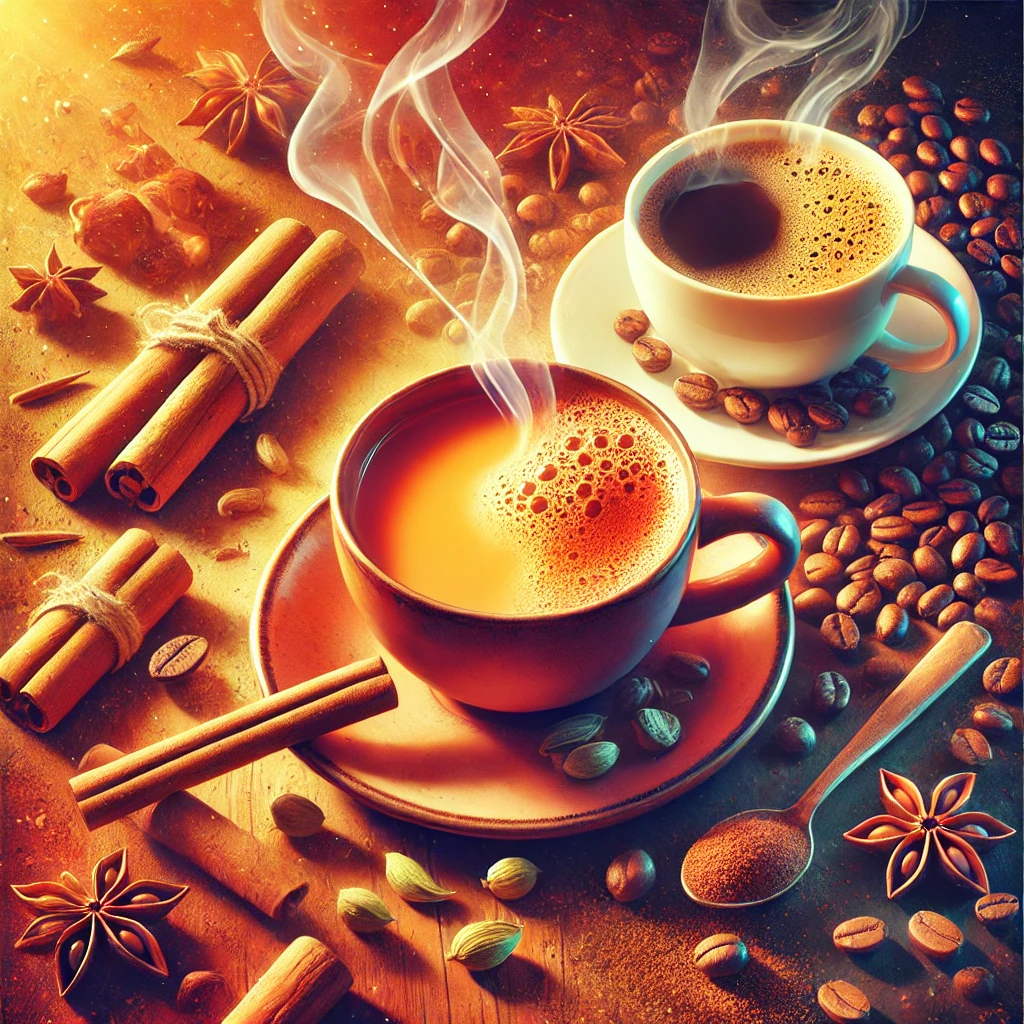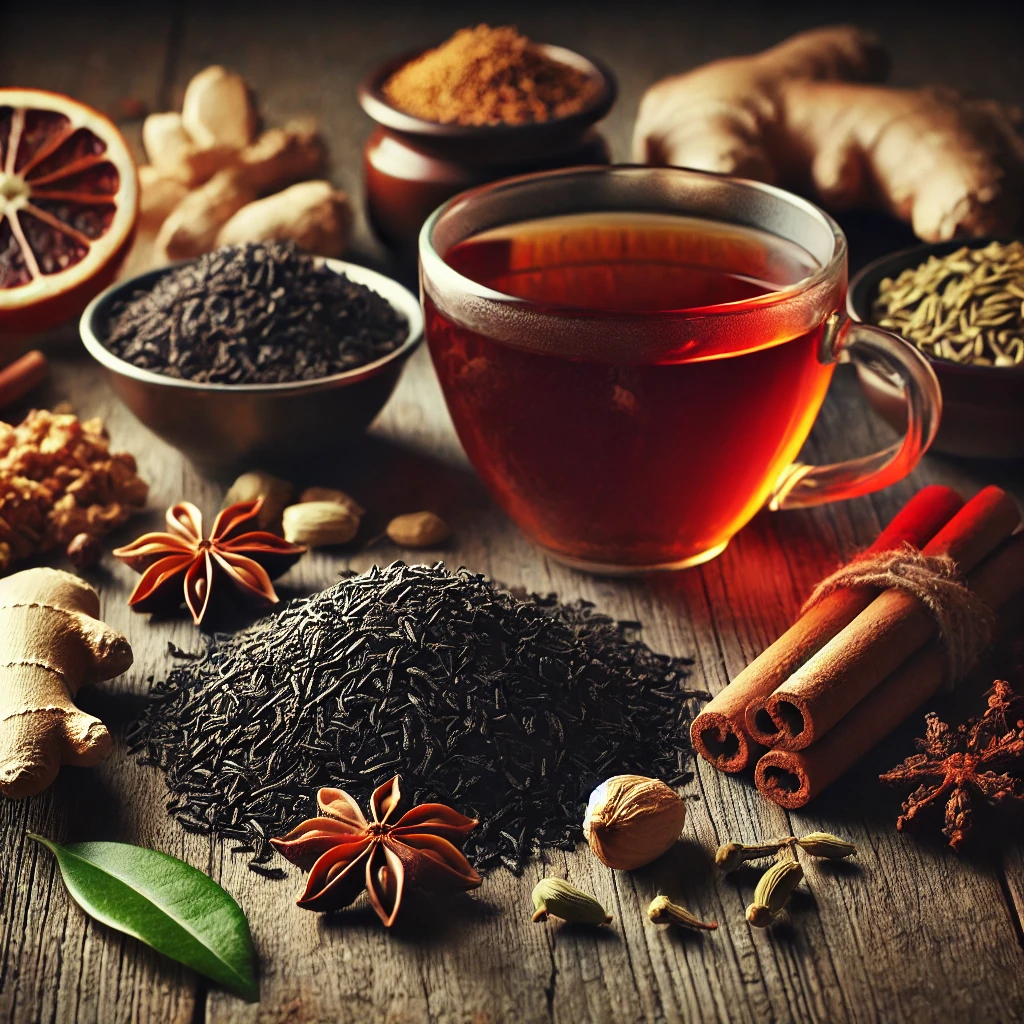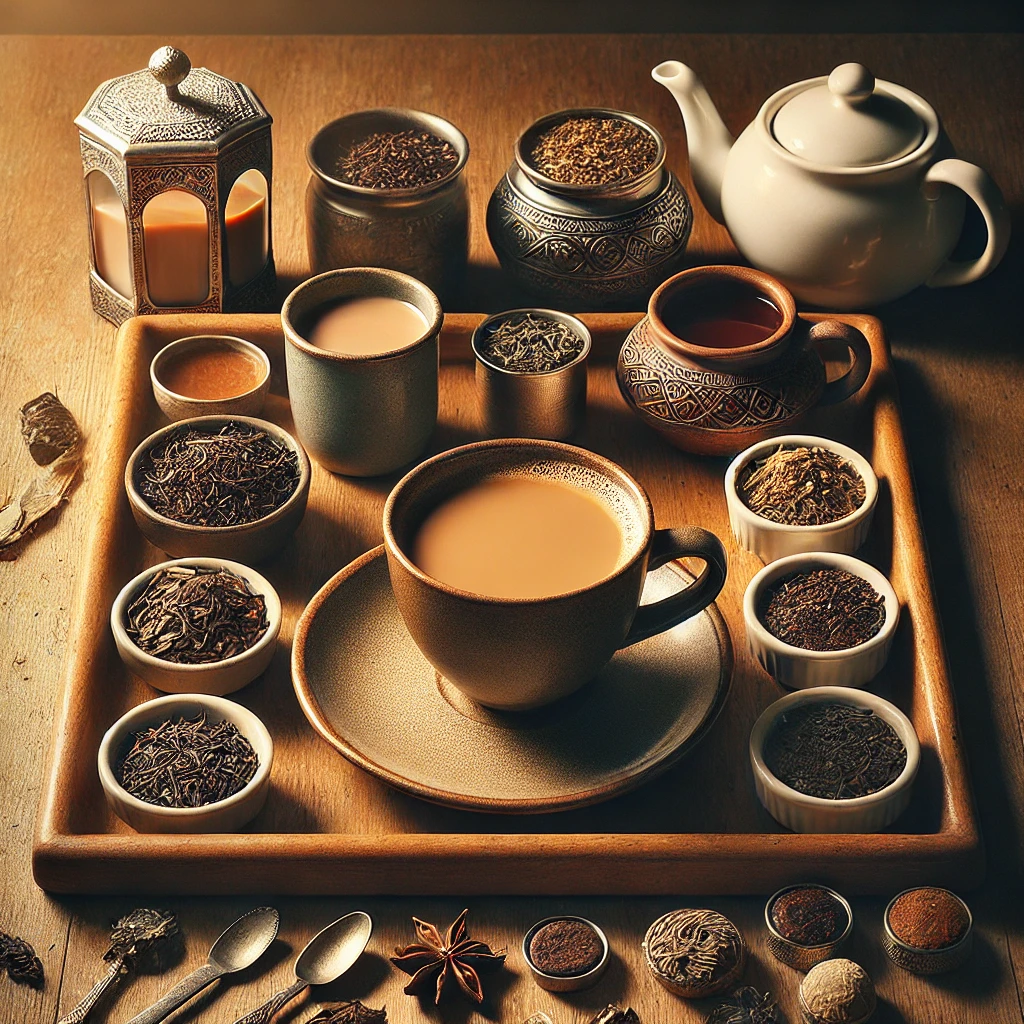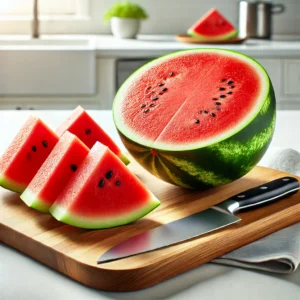
Does chai tea have caffeine?
This is a question many tea enthusiasts and curious drinkers ask when considering adding this flavorful beverage to their daily routine.
Chai tea, with its rich blend of spices and robust flavors, has become a popular choice.
But for those sensitive to caffeine or simply wanting to know more about their favorite brew, understanding how chai tea compares to other caffeinated beverages like coffee and different types of tea is essential.
In this blog post, we’ll explore the caffeine content in chai tea, how it stacks up against coffee and other teas, and what you need to know to make the best choice for your lifestyle.
What Is Chai Tea?

Before diving into the question “does chai tea have caffeine,” it’s important to understand what chai tea actually is.
Chai tea, also known simply as “chai” or “masala chai,” is a spiced tea blend that originated in India.
In Hindi, “chai” translates to “tea,” while “masala” is a blend of spices.
Traditional chai tea is made by brewing black tea with a combination of aromatic spices.
The resulting beverage is often sweetened with sugar or honey and mixed with milk to create a creamy, flavorful drink.
Chai tea has gained immense popularity around the world, with many variations and preparations available.
While some people enjoy their chai tea with a strong kick of spices, others prefer a milder version.
Regardless of the variation, chai tea remains a beloved drink for its warm and comforting qualities.
Does Chai Tea Have Caffeine?
Now, let’s address the central question: does chai tea have caffeine?
The short answer is yes, chai tea does contain caffeine, but the amount varies depending on a number of things like tea type, length of brewing, and the preparation method.
Caffeine in Black Tea
The primary ingredient in traditional chai tea is black tea, which naturally contains caffeine.
On average, an 8-ounce cup of black tea contains about 40-60 milligrams of caffeine.
When black tea is used as the base for chai, the resulting beverage will have a similar caffeine content, although this can be slightly influenced by the brewing time and the proportion of tea leaves to water.
Factors Affecting Caffeine Content
For example, the length of time the tea is steeped can influence how much caffeine is extracted from the leaves.
Additionally, the amount of tea leaves used in the preparation will also impact the caffeine level—more tea leaves typically mean more caffeine.
Caffeine Content in Different Chai Variations
It’s also worth noting that not all chai teas are made with black tea.
Some variations use green tea, white tea, or even herbal tea as the base.
Green tea has less caffeine than black tea, with about 20-45 milligrams per 8-ounce cup, while white tea contains even less, around 15-30 milligrams.
Herbal chai teas, which use a blend of spices without any actual tea leaves, are typically caffeine-free.
How Does Chai Tea Compare to Coffee?

When comparing the caffeine content of chai tea to coffee, you’ll find that coffee generally contains significantly more caffeine.
An 8-ounce cup of brewed coffee typically contains 95-200 milligrams of caffeine.
Caffeine Content Comparison
To put it into perspective, a standard cup of chai tea made with black tea has roughly half the caffeine content of a cup of coffee.
This makes chai tea a popular choice for those who want a moderate caffeine boost without the intensity of coffee.
For individuals sensitive to caffeine, chai tea can be a more manageable option, providing energy and alertness without the jitters often associated with coffee.
Other Benefits of Chai Tea vs. Coffee
Aside from caffeine content, chai tea and coffee offer different health benefits.
Chai tea is rich in antioxidants from the black tea and spices, which can help protect the body from oxidative stress and inflammation.
The spices in chai, such as ginger and cinnamon, also have anti-inflammatory properties and can aid digestion.
On the other hand, coffee is known for its high antioxidant content as well, and it has been linked to improved cognitive function and a lower risk of certain diseases, such as Parkinson’s and Alzheimer’s.
Taste and Flavor Profiles
The flavor profiles of chai tea and coffee are also quite different.
Chai tea offers a complex blend of spices and sweetness, which can be soothing and satisfying.
Coffee, with its bold and sometimes bitter taste, is preferred by those who enjoy a stronger, more straightforward flavor.
The choice between chai tea and coffee often comes down to personal preference and the desired caffeine intake.
How Does Chai Tea Compare to Other Teas?
While coffee is the most popular caffeinated beverage worldwide, tea comes in a close second, with a wide variety of options available.
Let’s compare the caffeine content of chai tea to other common teas:
Green Tea vs. Chai Tea
Green tea, like chai tea, contains caffeine, but generally less than black tea.
An 8-ounce cup of green tea typically may have (caffeine) up to 20-24 milligrams.
This means that chai tea made with black tea will have more caffeine than a cup of green tea.
However, green tea offers its own set of health benefits, including high levels of antioxidants known as catechins, which are believed to support heart health and boost metabolism.
White Tea vs. Chai Tea
White tea is another popular type of tea with lower caffeine content than both green and black teas.
With around 15-30 milligrams of caffeine per 8-ounce cup, white tea is a good option for those who want to limit their caffeine intake while still enjoying the benefits of tea.
Herbal Tea vs. Chai Tea
Herbal teas, such as chamomile, peppermint, and rooibos, are naturally caffeine-free since they are made from herbs, flowers, and other plant materials rather than tea leaves.
Herbal chai tea blends, which use a mixture of spices without any actual tea, are also caffeine-free.
These blends offer the same warming and flavorful experience as traditional chai tea without the caffeine.
For those looking to avoid caffeine altogether, herbal chai is an excellent choice.
Oolong Tea vs. Chai Tea
Oolong tea has more caffeine than green tea but less then black tea, with an 8-ounce cup containing about 30-50 milligrams of caffeine.
This puts oolong tea and chai tea relatively close in caffeine levels, though the exact amount will depend on the specific blend and preparation method.
Oolong tea is known for its smooth, rich flavor and is often enjoyed by tea enthusiasts who appreciate a balance between the strength of black tea and the subtlety of green tea.
Caffeine Sensitivity and Chai Tea
For individuals who are sensitive to caffeine, understanding how much caffeine is in their beverages is crucial.
Caffeine sensitivity can vary greatly from person to person, with some people experiencing jitteriness, anxiety, or insomnia.
If you know you’re sensitive to caffeine, it’s important to consider this when choosing your chai tea.
Decaffeinated Chai Tea
One option for those who want to enjoy the taste of chai tea without the caffeine is to opt for decaffeinated chai tea.
Decaf chai tea offers the same rich, spiced flavors without the stimulating effects of caffeine.
Caffeine-Free Herbal Chai
As mentioned earlier, herbal chai teas are another excellent option for those avoiding caffeine.
These blends use a combination of spices and herbs to create the signature chai flavor without any tea leaves, making them completely caffeine-free.
Herbal chai is perfect for enjoying any time of day, even in the evening when you want to avoid caffeine before bed.
Does Chai Tea Have Caffeine? What You Need to Know

So, does chai tea have caffeine?
The answer is yes, but the amount can vary depending on the type of tea used and how it’s prepared.
Traditional chai tea made with black tea contains a moderate amount of caffeine, typically around 40-60 milligrams per cup.
This is significantly less than coffee, making chai tea a good option for those who want a milder caffeine boost.
However, if you’re sensitive to caffeine or simply want to avoid it, there are plenty of alternatives available.
Decaffeinated chai tea and herbal chai blends offer the same delicious flavors without the caffeine, allowing you to enjoy your favorite beverage at any time.
Final Thoughts
Chai tea is a versatile and flavorful drink that can be enjoyed in many forms, whether you’re looking for a caffeinated pick-me-up or a soothing, caffeine-free treat.
Understanding the caffeine content in chai tea and how it compares to other beverages can help you make informed choices about what to drink, based on your personal preferences and lifestyle.
Whether you choose to sip on a traditional cup of chai tea, opt for a decaf version, or enjoy a herbal blend, the warm, spiced flavors of chai are sure to provide comfort and enjoyment.
As with any caffeinated beverage, it’s important to listen to your body and adjust your consumption as needed to find the right balance for you.
Conclusion

In conclusion, does chai tea have caffeine? Yes, it does, but the amount varies depending on the type of tea used and how it’s prepared.
Chai tea made with black tea typically contains about 40-60 milligrams of caffeine per cup, making it a moderate choice compared to coffee, which contains much more.
Decaffeinated chai tea and herbal chai blends offer excellent alternatives.
When compared to other teas, chai tea made with black tea has more caffeine than green or white tea, but less than coffee.
Herbal teas, including herbal chai, are naturally caffeine-free, making them ideal for those avoiding caffeine altogether.
So, the next time you brew a cup of chai tea, you’ll know exactly what to expect in terms of caffeine content and how it stacks up against your other favorite drinks.




